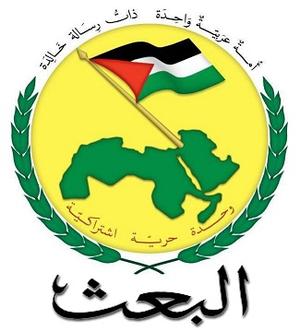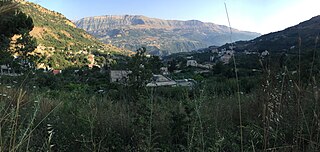
North Lebanon is the northern region of Lebanon comprising the North Governorate and Akkar Governorate. On 16 July 2003, the two entities were divided from the same province by former Prime Minister Rafik Hariri. The division was known as Law 522.

The Kurdish Democratic Party in Lebanon, is the Lebanese branch of a namesake Iraqi-based Kurdish nationalist party, established by Jamil Mihhu in 1960, and based in Lebanon. However, it was not licensed until 24 September 1970.

The Razkari Party is a Lebanese-Kurdish political group that was established on 3 April 1975 by Faysal Fakhru, due to disagreement with the policies of the Kurdish Democratic Party – Lebanon (KDP-L) under Jamil Mihhu. The three main points of disagreement that led to the formation of the Razkari Party were the KDP-L's failure to appeal to non-Kurmanji-speaking Kurds, its support for the Iraqi government's proposals in the Iraqi–Kurdish conflict, and accusations of nepotism within the party's leadership. The Razkari Party continued to exist following the end of the Lebanese Civil War, becoming the only political party to represent Lebanon's estimated 100,000 Kurds, and aligning itself with Hezbollah and the March 8 Alliance.
Lebanese Turkmen, also known as the Lebanese Turks, are people of Turkish ancestry that live in Lebanon. The historic rule of several Turkic dynasties in the region saw continuous Turkish migration waves to Lebanon during the Tulunid rule (868–905), Ikhshidid rule (935–969), Seljuk rule (1037–1194), Mamluk rule (1291–1515), and Ottoman rule (1516–1918).

The Green Party of Lebanon is a Lebanese green political party. Founded in August 2008, the green party advocates environmental protection, sustainable development, and human rights in Lebanon. It is the first Lebanese party to focus primarily on Green politics.

The Mount Lebanon Mutasarrifate was one of the Ottoman Empire's subdivisions following the 19-century Tanzimat reform. After 1861, there existed an autonomous Mount Lebanon with a Christian Mutasarrif (governor), which had been created as a homeland for the Maronites under European diplomatic pressure following the 1860 Druze–Maronite conflict. The Maronite Catholics and the Druze founded modern Lebanon in the early eighteenth century, through the ruling and social system known as the "Maronite-Druze dualism" in Mount Lebanon.

The Arab Socialist Ba'ath Party – Lebanon Region, commonly known as the Arab Socialist Ba'ath Party in Lebanon and officially the Lebanon Regional Branch, is a political party in Lebanon. It is the regional branch of the Damascus-based Arab Socialist Ba'ath Party. The leadership has been disputed since 2015; however, Fayez Shukr was the party leader from 2006 to 2015, when he succeeded Sayf al-Din Ghazi, who succeeded Assem Qanso.

The Socialist Arab Lebanon Vanguard Party is a political party in Lebanon. The party was led by Abd al-Majid al-Rafei until his death in July 2017. It is the Lebanese regional branch of the Iraqi-led Ba'ath Party. The party held its second congress in October 2011. Founders of the party included Dr. Abd al-Majid al-Rafe'ii, Jihad George Karam, Rafiq Naseeb al-Faqih,Rashid Abo Falah,Karam Mohamed al-Sahili, Hani Mohammad Sho'aib, Ammar Mohammad Shibli, Hassan Khalil Gharib and Wassef El Harakeh. Although formally affiliated to the Sunni-dominated regime in Baghdad, the majority of the party's members were Lebanese Shiites.

Mazraat es-Siyed is a mountainous village in the highlands of the Byblos District in the Keserwan-Jbeil Governorate, Lebanon. The town is 58 kilometres (36 mi) away from Beirut, and stands at an elevation of 1,250 m (4,100 ft) above sea level.

The Great Famine of Mount Lebanon (1915–1918), also known as Kafno, was a period of mass starvation on Mount Lebanon during World War I that resulted in the deaths of 200,000 people, most of whom were Maronite Christians.
The Syrian–Mount Lebanon Relief Committee was an organization "formed in June of 1916 under the chairmanship of Najib Maalouf and the Assistant Chairmanship of Ameen Rihani" in the United States. Kahlil Gibran was its secretary. Its offices were at 55 Broadway, New York. It aimed at working in cooperation with the American Committee for Armenian and Syrian Relief, and raised "some $165,815 in two and a half years from about 15,000 Syrian subscribers in America."
Golan Haji is a Syrian Kurdish writer, poet, and translator. He has published five poetry collections in Arabic, including He Called Out Within The Darknesses, which won the first prize in the Muhammad Al-Maghout Poetry Competition in 2006. He has translated several books from English into Arabic such as Palm-of-the-Hand Stories by Yasunari Kawabata and Dark Harbor by Mark Strand. Some of his works are part of Syrian literature in the context of war.
Khalil Ahmad Khalil is a Lebanese intellectual, researcher, translator, prolific, and academic. He was born in 1942 in Sur, South Lebanon. He has many works in the fields of sociology in religion, politics, culture and philosophy, as well as a great number of translations, including Lalande's Encyclopedia of Philosophy and the glossary of philosophical terms. He is considered one of the most prominent Arab intellectuals of the 20th century, and a leading member of the Progressive Socialist Party. He joined the Party in 1968, and retired all organizational politics work after the assassination of Party leader Kamal Jumblatt. He received a prize for his published works and translations, which enriched the Arabic library, as well as his academic achievement in the Lebanese University.
Salah Naoum Al Labaki was a Lebanese poet, scholar, journalist, and lawyer. His poems and writings have received academic attention. Some regard him to be among the poets who introduced "modern Arabic poetry" in the late 20th century. Labaki is considered a pioneer of the renewal movement in Arabic poetry, and more specifically in Lebanese poetry, in the second quarter of the 20th century. Some of his poems were translated into Spanish. He received the academic French medal, The National Order of Cedar in the officer rank, and an honorary degree from The International Institute of California.
Farhan Osman Saleh is a writer, researcher and militant from Lebanon. He was born in 1947, in the town of Kfarchouba in southern Lebanon. He is known for supporting Arab nations involved in the Israeli–Palestinian conflict. Saleh has published several books on politics, social, history and culture. He also writes fot Lebanese and Arab newspapers and magazines. He has also contributed to the establishment of a house for the dissemination of enlightening and modernist thought, a cultural magazine, and a seminar for cultural dialogue with a group of thinkers and intellectuals in Lebanon and the Arab world.
Abd Al Raouf Sinu is a Lebanese author who was born in Beirut. He was a member of the international delegation for Election Observation in Germany, 2009. Sinu received his PhD in philosophy of history from in 1982. He served as Dean of the Faculty of Education in from 2001 to 2004. He became a member of in Germany from 2008 till date. Also, he is a member of plenty of international and local boards, most notably are: 'The International Delegation of Germany's Election Observation', and 'The Board of Trustees of the Development, Studies, and Pedagogic Clinic Foundation in Beirut'.
Dahr al-Wahsh massacre occurred in the Lebanese village of Dahr al-Wahsh during the final stage of the Lebanese Civil War, in 13 October,1990, when the Syrian forces and their Christian militias allies executed as many as 240 prisoners of war and army members of General Michel Aoun, the then de facto leader of Lebanon, who had declared a War of Liberation against Syrian forces occupying Lebanon, which led to intense confrontations.
Muhammad Jamil Bayham was an Arab-Lebanese historian, politician, writer and reformer who wrote dozens of books and articles.

Kazim Jasir Faraj, better known as Kazim al-Samawi, was an Iraqi poet and journalist known for his humanist worldview. From the 1950s, he spent more than half of his life in exile as a political refuge and was known by title "The Elder of the Iraqi exiles" or "The Shaykh of Exiles". He moved between many countries, such as Lebanon, Hungary, Germany, China, Syria and Cyprus until he finally settled in Sweden. Al-Samawi published his first poetry collection in 1950 and was as a result was persecuted by the Nuri al-Said government. Later, he and his family faced persecution in Ba'athist Iraq, and he experienced the death of almost all his family members, often in quick succession. Through his poetry in various forms, genres and metres, he was very involved in general human affairs. His family name is derived from his hometown demonym, Samawah. He studied in Baghdad and graduated from the Rural Teachers’ House in 1940, continued his higher studies in Hungary and graduated from the Faculty of Arts in 1956. He worked for a while in journalism in Baghdad with a progressive tendency, founded The Humanity in 1956, a twice-weekly leftist newspaper. He left about seven poetry collections that have been translated into several languages. Al-Samawi died at the age of 85 in Stockholm and was buried in Sulaymaniyah.

Wadi al-Hujeir is a valley and nature reserve in Jabal Amil, across the Nabatieh, Bint Jbeil and Marjeyoun districts of Southern Lebanon.










